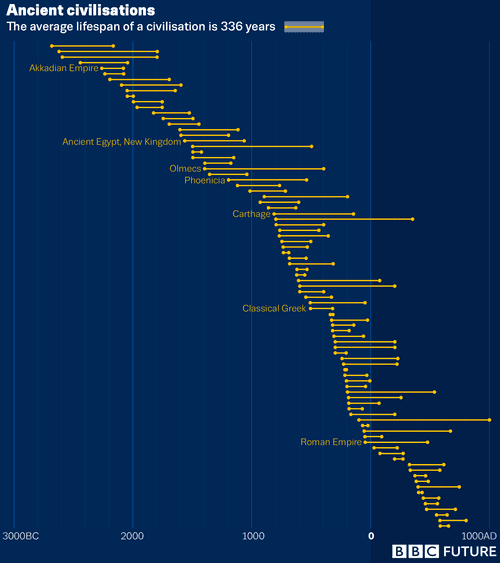Are we on the road to civilisation collapse?
Curated from: bbc.com
Ideas, facts & insights covering these topics:
7 ideas
·2.46K reads
6
Explore the World's Best Ideas
Join today and uncover 100+ curated journeys from 50+ topics. Unlock access to our mobile app with extensive features.
When civilizations collapse
Looking at the rise and fall of historical civilizations, the forces that precipitate or delay a collapse can tell us about our own.
We can define collapse as a rapid and enduring loss of population, identity, and socio-economic complexity. Public services fold, and chaos ensues as the government loses control.
Some past civilizations recovered, such as the Chinese and Egyptian. Other collapses were permanent. Sometimes the epicenter is revived, such as Rome. In other cases, they are left abandoned, as was the case with the Mayan ruins.
118
601 reads
We're not immune to collapse
Societies of the past and present are just complex systems comprising of people and technology.
Although we have better technologies, we are not immune to the threats that faced our ancestors. If anything, our technological abilities bring more challenges. Our globalized economic system may be more likely to cause a crisis to spread.
100
412 reads
A roadmap of past collapses
Although there is no conclusive explanation of why civilizations collapse, there are factors that can contribute.
- Climatic change can result in disaster, resulting in crop failure, starvation, and desertification. The Akkadians, the Mayan, the Roman Empire, and many others coincided with abrupt climatic changes.
- Ecological collapse theory: When societies overdo the carrying capacity of their environment, e.g., excessive deforestation, water pollution, soil degradation, and the loss of biodiversity.
- Inequality and oligarchy: As a population increases, the supply of labor outstrips demand, workers become cheap and society top-heavy. Political violence follows.
- Complexity: Accumulated complexity and bureaucracy eventually leads to collapse. The returns from complexity eventually reach a point of diminishing returns, causing collapse.
- External shocks: War, natural disasters, famine, and plagues. The Aztec Empire was brought to its knees by Spanish invaders. Early agrarian states were passing due to deadly epidemics.
- Randomness: Collapse is often random and independent of age.
122
386 reads
Metrics for our chance of collapse
Four possible metrics serve as indicators to see if our chance of collapse is falling or rising.
- Temperature is a clear metric for climate change.
- Complexity is represented by GDP.
- The ecological footprint is an indicator of environmental degradation.
- Inequality. The typical measurement of the Gini Index shows inequality has decreased slightly globally but increasing within countries. As the Gini Index only measures relative changes in income, it may be misleading.
Temperature, complexity, and environmental degradation have been trending steeply upwards.
107
291 reads
Measures of resilience
The collapse metrics are not the whole picture without also adding societal resilience, which may delay or prevent collapse.
- Global economic diversity - a measurement of the diversity and sophistication of country exports - is higher today than fifty years ago.
- Innovation, as measured by per capita patent applications, is also rising. New technologies can create a buffer against pressures such as climate change.
100
228 reads
The past as our teacher
In the past, collapse was within a region. Today the world is deeply interconnected and interdependent, making societal collapse more treacherous.
- The weapons available today range from biological agents to nuclear weapons.
- People produce food and essential goods in an increasingly specialized manner. Climate change may damage our ability to return to simple farming practices.
With all the advances, any collapse could result in an existential risk. But we will only collapse if we advance blindly and are unwilling to look at the past.
96
249 reads
Responsibility and Prevention
History suggests that a collapse of our civilization, although likely, is not inevitable.
We may slow the chance of a future collapse if we reduce emissions, level inequalities, reverse environmental degradation, innovate, and diversify our economies. We can also invest in recovery. Avoiding the creation of dangerous technologies is also critical.
99
301 reads
IDEAS CURATED BY
Whenever I have a problem I just sing, then I realize my voice is worse than my problem
Christopher C.'s ideas are part of this journey:
Learn more about problemsolving with this collection
Strategies for building self-confidence
Techniques for embracing your strengths and accomplishments
Tips for seeking support and feedback
Related collections
Similar ideas
Read & Learn
20x Faster
without
deepstash
with
deepstash
with
deepstash
Personalized microlearning
—
100+ Learning Journeys
—
Access to 200,000+ ideas
—
Access to the mobile app
—
Unlimited idea saving
—
—
Unlimited history
—
—
Unlimited listening to ideas
—
—
Downloading & offline access
—
—
Supercharge your mind with one idea per day
Enter your email and spend 1 minute every day to learn something new.
I agree to receive email updates

